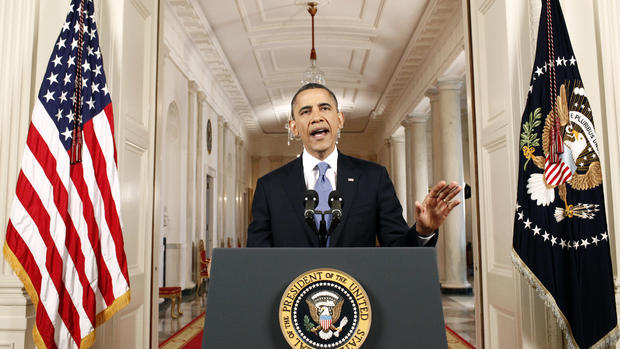Romney: Health care ruling creates 'choice' between two agendas
(CBS News) Reacting to the Supreme Court decision largely upholding President Obama's health care law, Mitt Romney on Thursday reaffirmed his desire to overturn the law, framing the ruling as enabling voters to make a clear distinction between current policy and what he called a far less government-intrusive approach.
"This is the time of choice for the American people," Romney said. "Our mission is clear: If we want to get rid of Obamacare, we're going to have to replace President Obama. My mission is to make sure we do exactly that."
While the court said the law does not violate the Constitution, Romney said, the justices did not take a position on whether it "is good law or that it's good policy. Obamacare was bad policy yesterday; it's bad policy today. Obamacare was bad law yesterday. It's bad law today."
He concluded his remarks by saying: "If you don't want the course that President Obama has put us on, if you want instead a course that the Founders envisioned, then join me in this effort. Help us. Help us defeat Obamacare. Help us defeat the liberal agenda that makes government too big, too intrusive and is killing jobs across this great country."
Romney spoke to reporters across from the Capitol after awaiting the decision in his room at the Washington Hilton. He returned to the D.C. area on Wednesday night to hold a campaign event in Virginia and attend a fundraiser in Georgetown.
Romney has sought to make the economy the overriding focus of his campaign, even as issues such as the Court's recent ruling on immigration have diverted him from that approach. But he had been previewing the health care ruling over the course of the week, suggesting that if the law was overturned, he would argue that the president had wasted the last three and a half years of his presidency and that his attention to health care reform was a "moral failure" amidst an economic crisis.
"It was not just bad policy; it was a moral failure to put forward a piece of legislation that wouldn't help Americans get back to work, and to focus the energy of the White House on Obamacare," he said in Sterling, Va., on Wednesday evening.
Going forward, Romney will continue to argue that the law is bad policy and overly burdensome on job creators, even if it is constitutionally sound.
While the Court's decision represents a major disappointment for conservatives, it will help ensure a fresh wave of excitement among the base to defeat Obama. Proof of that came in the more than $300,000 that Romney spokeswoman Andrea Saul said was raised within 90 minutes of the ruling's announcement.
The worst outcome for Romney's campaign strategy would have been if the law had been overturned, as he would have lost a chief rationale for his campaign.
It posed a significant challenge to the presumptive nominee during the primary campaign -- and still could do so -- because of a 2006 law he championed as Massachusetts governor that bore remarkable resemblance to the federal law in its use of mandates to ensure maximum coverage.
Although Romney has repeatedly argued that his plan was only appropriate for Massachusetts, not the nation, the Obama administration cited the state health care law he championed as a model for the federal law.
Romney's reasoning wasn't enough for many of his opponents. Former Pennsylvania Sen. Rick Santorum was particularly vicious on during the primary campaign, painting his rival as "uniquely disqualified" to do away with the law.
Santorum appeared on the steps of the Supreme Court while lawyers were arguing the case before the justices and said, "There's one candidate who is uniquely disqualified to make the case. It's the reason I'm here and he's not. The reason that I talk about Obamacare and its impact on the economy and on fundamental freedoms and Mitt Romney doesn't. It's because he can't because he supported government-run health care as governor of Massachusetts."
For now, Romney will continue to run on a pledge to repeal and replace the health care law as president. He has said that he will issue states a waiver from the law. He has also said he would like to block grant Medicaid money to the states and put in place reforms to make the healthcare industry "more like a market" by giving consumers more options. He has also said he would like to give seniors the option of purchasing "private-sector Medicare."
